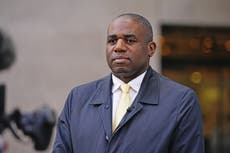Brexit: This is how Britain could actually rejoin the EU
Prominent Remainer Gina Miller explains what would need to happen for Britain to reverse Brexit and return to the bloc
If you asked the British public to vote today, they’d want to be inside the EU – that’s the pollsters’ verdict. So what’s stopping us?
Despite public opinion settling ever more strongly against Brexit, no major political party is now offering a second referendum.
But let’s imagine the political class caught up with the feelings of most Britons in 2023. How could Brexit be reversed?
Remainer Gina Miller, who rose to prominence in 2017 when her court challenge successfully prevented the government from leaving the EU without a parliamentary vote, has a plan.
It’s doable, she says – but it won’t be simple.

“Whatever the polls show and people’s regret and sentiment, the UK cannot simply rejoin the EU, without understanding the legal process,” she told The Independent.
“Under EU law, the UK is now a third country so would have to reapply and undergo the whole accession procedure from scratch, under Article 49 of the Treaty of European Union.”
What conditions would Britain have to meet?
Article 49 – the somewhat less famous sister of Article 50 (the formal process of leaving the EU) – is the article of the EU treaty that governs joining the bloc.
It states that “any European State” which respects the common EU values and is “committed to promoting them may apply to become a member of the union”.
These values include “human dignity, freedom, democracy, equality, the rule of law”. In other words, Britain would have to ensure its house was in order.
Britain would have to meet the so-called “Copenhagen Criteria” – a functioning market economy, institutional capacity to deal with EU law, and above all, political stability guaranteeing democracy and the rule of law.
It would also need the green light from the European Commission and European Council to start talks.
As a recent member, the UK should have no problems with this stage, Ms Miller believes.
“We cannot foresee that the UK would not satisfy the treaty and Copenhagen criteria, so it is very unlikely the UK would encounter difficulties,” she said.
What happens then?
Once talks have started, they might not be quick.
“On average it has taken approximately nine years for a current member from submitting a membership application to signing an accession treaty,” Miller said, citing examples including Cyprus, the Czech Republic, Estonia, Hungary, Latvia, and Lithuania.
But Britain would have an advantage over these countries – its recent membership.
“As the UK has not diverged significantly from EU regulations and maintains a stable economy and well-functioning political institutions, accession should be faster,” she argued, quoting Professor Jacob Öberg in an article for East Anglia Bylines.
This is true for now, anyway. “If the Tories won the general election in 2024 and continue their low regulation, divergence, anti-human rights, anti-international law agenda this would become much more difficult,” Ms Miller said.
“As it took Sweden and Finland only three years from application to the signing of an accession treaty, we see no reason why this time frame is not feasible for the UK.”
What about Britain’s opt-outs?
When the UK was a member of the EU, it enjoyed a number of opt-outs: adopting the Euro as currency, for example, and accepting certain parts of home affairs policy. It also enjoyed a special budget rebate.
While bespoke terms of membership, these aren’t unique, Miller explains.
“Denmark has an opt-out from the Euro and Ireland has an opt-out from Schengen (the agreement on relaxed border controls),” she said.
“Croatia, Cyprus, Romania and Bulgaria have yet to join the Schengen area but are legally obliged to.
“Seven countries – Bulgaria, the Czech Republic, Denmark, Hungary, Poland, Romania, and Sweden – are EU members but do not use the Euro.”
“We may have to accept that the budget rebate and special justice and home affairs arrangements may be more problematic but as the UK being an EU member benefits both the UK and EU, the UK should be resolute in any negotiations,” Miller argued.
So that’s it?
Britain would need the approval of all member states – and of the European Parliament – before it could formally rejoin.
“Article 49 TEU specifies that member states must agree unanimously before a new member is admitted, and the Parliament must also agree by an absolute majority of its members,” Miller said.
“If all negotiations are concluded successfully, ratification and implementation would follow. The hurdles are not insurmountable – where there is a will, there is a way!”
Miller said the key hurdles for the UK in rejoining the EU “are mainly political and not legal”.
“I accept that the bad faith of the last seven years will make the EU cautious, but having the UK back is to the benefit of all EU member states,” she added.
Join our commenting forum
Join thought-provoking conversations, follow other Independent readers and see their replies
Comments



Bookmark popover
Removed from bookmarks